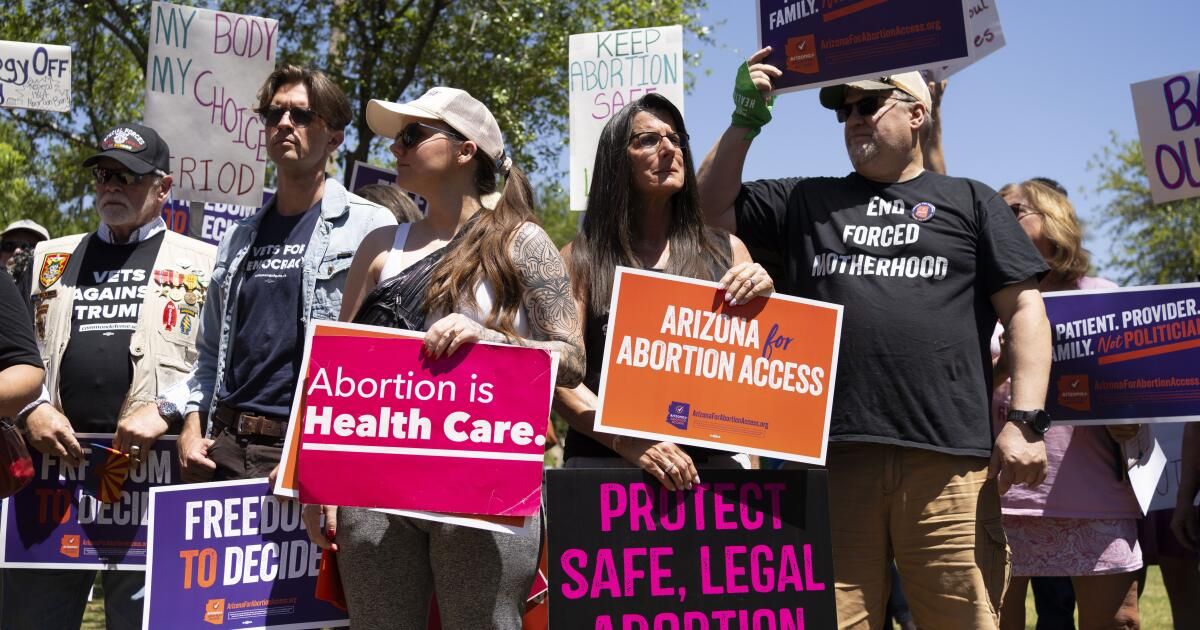The Arizona Senate voted Wednesday to repeal the state's 1864 abortion ban, sending a measure to the Democratic governor that would end weeks of unrest and maintain a 15-week abortion limit enacted in 2022.
In a testy and emotional session that included angry arguments, one senator reading the Bible and another playing a recording of his daughter's fetal heartbeat, the Senate voted 16-14 to repeal the law, with two Republicans joining Democrats. to support the measure.
The Senate was voting on the text that the Arizona House of Representatives approved a week ago, when three Republicans joined Democrats to approve the repeal bill.
The bill will next go to Gov. Katie Hobbs, a Democrat who has called on the Legislature to repeal the pre-statehood ban.
“I am glad to see that the Senate responded to my call and voted to repeal the complete abortion ban of 1864. While this is essential to protect women's health, it is just the beginning,” Hobbs said in a statement a once the Senate session is over. “I will never stop fighting for women's reproductive freedoms.”
Wednesday's Senate actions, which were punctuated by angry calls from a gallery packed with activists, underscore how lively the abortion issue will be in the November elections. The two Republicans, Senators TJ Shope and Shawnna Bolick, received criticism from their fellow Republicans for voting to repeal the law. Several senators gasped during their speeches, with one comparing their emotions to “like when 9/11 happened.”
“Our Democratic colleagues, who are very good at sticking together… vote together,” said Sen. Dave Farnsworth. “Unfortunately, on this side of the aisle, we're not as good at doing that.”
Shope did not explain his vote during the legislative session, but wrote previously that he supported the repeal because “15 weeks is what my district considers an appropriate schedule.”
Bolick, who is married to Arizona Supreme Court Justice Clint Bolick, who ruled in favor of upholding the ban, defended her vote. She took more than 20 minutes to tell the stories of three difficult pregnancies, prompting many other lawmakers, including Senate President Warren Petersen, to interrupt her, complaining that her stories were unrelated to her vote. she.
“The comments are pertinent because not all pregnancies are the same,” she said.
At the end of her three stories, Bolick said: “I know the chronicles of these pregnancies very intimately because they are all mine.”
He added that the proposed constitutional amendment to protect abortions goes too far and concluded: “I want to protect our state constitution from unlimited abortions up to the moment of birth. … I’m here to protect more babies.”
Data for Progress, a progressive think tank, surveyed Arizonans the day after the state Supreme Court ruling and found that 66% of likely voters disapproved of the court's decision to ban nearly all abortions. The ruling sent state Republican leaders scrambling to find a solution that would appease voters before November.
“I'll hear my colleagues say… it's politically astute because we could lose votes, we could lose the Legislature. We could lose the presidential election,” Republican Sen. Wendy Rogers said Wednesday. “And I tell them that it is more important to do the right thing. Because maybe not in this life, but after this life we will find our creator. And whatever your faith is, this is what matters.”
Biden's campaign has cast abortion as a top motivator for Democrats this fall, especially in battleground states. As the Arizona Legislature wrangled over its bill, Vice President Kamala Harris gave a speech on reproductive freedom in Florida to draw attention to that state's six-week abortion ban, which went into effect Wednesday.
“In states across our nation, extremists have proposed and passed laws that criminalize doctors and punish women,” Harris said. “Laws that threaten doctors and nurses with prison sentences, even life, simply for providing reproductive care. Laws that make no exceptions in cases of rape or incest. Even reviving laws from the 19th century.”
The Arizona Supreme Court set off a firestorm when it ruled in early April to ban all abortions except when the woman's life is at risk, a provision that was added to Arizona code in 1864, decades before the territory became a state. The 15-week ban, which Arizona will return to, does not include exceptions for rape or incest. It does allow abortions, even after 15 weeks, if a doctor determines a medical emergency exists.
The repeal will not take effect until 90 days after the Legislature adjourns, which could take weeks. The 1864 law could still go into effect in June and remain active until the legislative session concludes and the 90-day period is completed. Abortion rights activists cautiously rejoiced Wednesday.
“We appreciate the efforts of reproductive freedom lawmakers to repeal this harmful abortion ban. Unfortunately, Arizonans will continue to live under a law that denies us the right to make decisions about our own health,” Chris Love, spokesperson for Arizona for Abortion Access, said in a statement. “Arizona residents cannot afford to celebrate or lose momentum. The threat to our reproductive freedom is more immediate today than ever.”
Activists say they have enough signatures to put a proposed constitutional amendment that would allow abortions in Arizona on the November ballot. Abortion is about to be a major issue for voters in the swing state, which President Biden narrowly won in 2020.












